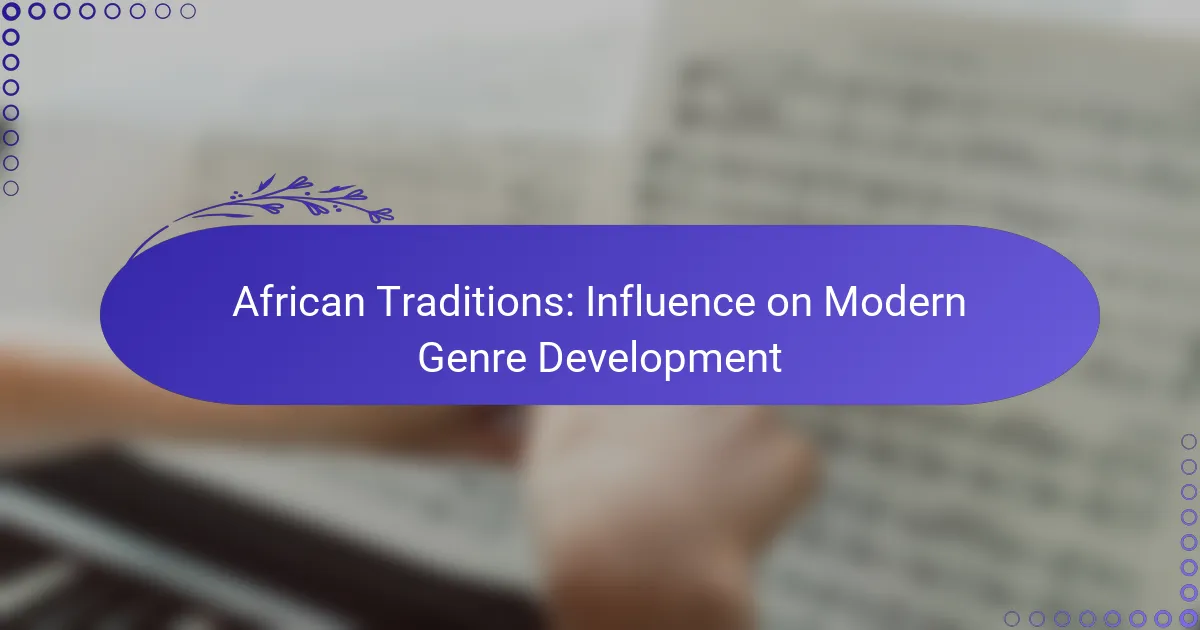African traditions play a crucial role in shaping modern music genres, infusing them with distinctive rhythms, instruments, and vocal styles. This cultural richness has led to the emergence of hybrid sounds in genres like jazz, hip-hop, and pop, enhancing their depth and diversity. By incorporating storytelling, dance, and spiritual elements, African cultural practices continue to influence contemporary creative expressions across various art forms.
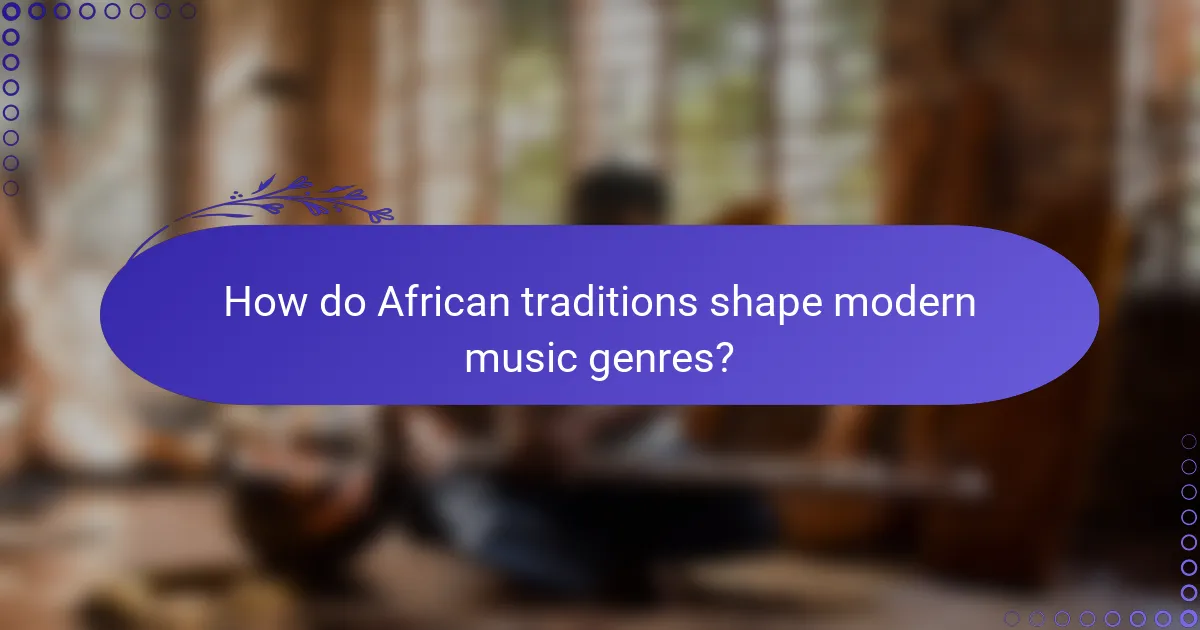
How do African traditions shape modern music genres?
African traditions significantly influence modern music genres by introducing unique rhythms, instruments, and vocal styles. These elements have been integrated into various genres, creating rich, hybrid sounds that reflect cultural diversity.
Influence on jazz
African musical traditions have profoundly shaped jazz, particularly through the incorporation of polyrhythms and call-and-response patterns. Musicians like Louis Armstrong and Duke Ellington drew inspiration from African drumming techniques, which added complexity and depth to jazz compositions.
The use of improvisation in jazz also mirrors African musical practices, allowing artists to express individuality while maintaining a connection to their roots. This blend of tradition and innovation has made jazz a dynamic and evolving genre.
Impact on hip-hop
Moreover, hip-hop’s storytelling aspect reflects African oral traditions, emphasizing community narratives and personal experiences. This connection enhances the genre’s authenticity and cultural significance.
Role in reggae
Reggae music is deeply rooted in African musical traditions, particularly through its rhythmic patterns and use of bass lines. The genre often features offbeat guitar strumming, which can be traced back to African influences, creating a laid-back yet compelling sound.
Additionally, reggae lyrics frequently address social and political issues, echoing the themes found in traditional African storytelling. This blend of rhythm and message has solidified reggae’s role as a voice for the marginalized.
Connection to blues
The blues genre has strong ties to African musical traditions, particularly in its use of call-and-response and expressive vocal techniques. The emotional depth of blues music often reflects the struggles and experiences of African Americans, rooted in their ancestral heritage.
Instruments like the guitar and harmonica in blues music also draw from African styles, contributing to the genre’s distinctive sound. This connection highlights the ongoing influence of African traditions in shaping American music.
Integration in pop music
Modern pop music frequently integrates elements from African traditions, such as rhythmic patterns and vocal styles. Artists like Beyoncé and Rihanna incorporate African-inspired beats and melodies, creating a global sound that appeals to diverse audiences.
The use of dance and visual elements in pop performances often reflects African cultural expressions, enhancing the overall experience. This integration not only enriches pop music but also celebrates its cultural roots.
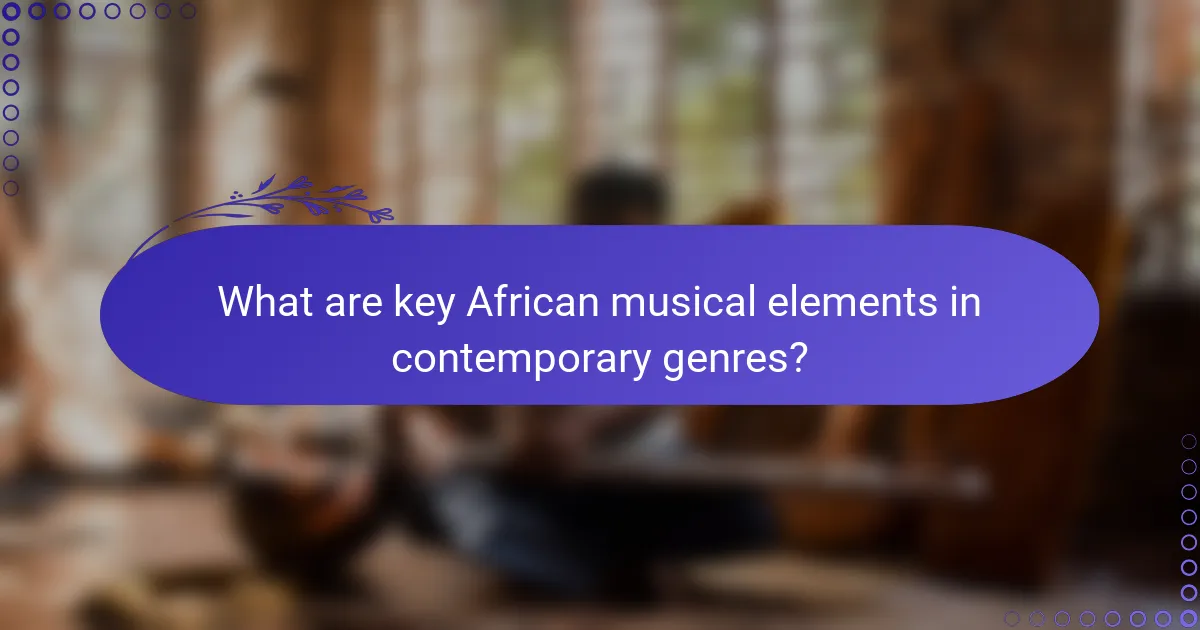
What are key African musical elements in contemporary genres?
Key African musical elements in contemporary genres include distinctive rhythmic patterns, unique instrumentation, varied vocal techniques, and the call and response format. These elements have significantly influenced genres such as jazz, hip-hop, and pop music, enriching their sound and cultural depth.
Rhythmic patterns
African music is renowned for its complex and polyrhythmic structures, which often involve multiple overlapping rhythms played simultaneously. These rhythmic patterns create a vibrant and dynamic feel, essential in genres like Afrobeat and hip-hop. Musicians can experiment with syncopation and varying time signatures to add depth to their compositions.
For example, the use of 6/8 or 12/8 time signatures is common in many African traditions, providing a groove that encourages movement and dance. When integrating these patterns into modern music, artists should consider how they can complement existing rhythms without overwhelming the listener.
Instrumentation
Instrumentation in African music often features traditional instruments such as the djembe, kora, and mbira, which contribute unique timbres and textures. Contemporary artists frequently incorporate these instruments into their music, blending them with electronic sounds or Western instruments to create innovative fusions. This combination can enhance the authenticity and appeal of modern genres.
When selecting instruments, consider the cultural significance and sound they bring to your music. For instance, using a djembe can add a rich percussive element, while a kora can introduce melodic layers that resonate with audiences familiar with African traditions.
Vocal techniques
African vocal techniques are characterized by their expressive quality, often involving techniques like throat singing, call and response, and intricate harmonies. These techniques not only showcase vocal agility but also foster a communal atmosphere during performances. Contemporary artists can draw inspiration from these styles to enhance their vocal delivery and engage listeners more effectively.
Incorporating vocal improvisation can also add a personal touch to performances. Artists should practice blending traditional techniques with their unique style to create a distinctive sound that honors African heritage while appealing to modern audiences.
Call and response
The call and response technique is a fundamental aspect of African music, where a leader sings or plays a phrase (the call) and the group responds. This interaction creates a sense of community and participation, making it a powerful tool in live performances. Modern genres can benefit from this technique by encouraging audience involvement and enhancing the overall experience.
To effectively incorporate call and response in contemporary music, artists should establish clear cues and ensure that the responses are simple enough for the audience to follow. This approach not only engages listeners but also fosters a deeper connection between the performer and the audience.
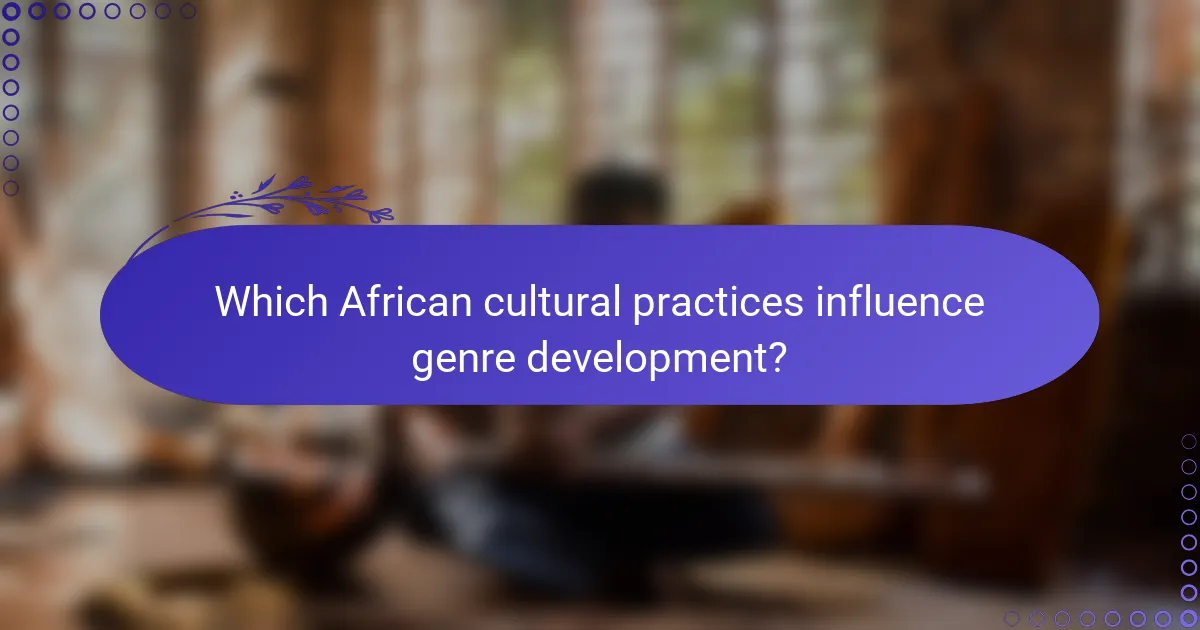
Which African cultural practices influence genre development?
A variety of African cultural practices significantly shape modern genre development across music, literature, and performance art. These influences stem from rich traditions that emphasize storytelling, dance, and spirituality, each contributing unique elements to contemporary creative expressions.
Storytelling traditions
African storytelling traditions are foundational to genre development, often featuring oral narratives that convey moral lessons, history, and cultural values. These stories typically utilize a call-and-response format, engaging audiences and fostering community participation.
Modern genres, such as hip-hop and spoken word, draw heavily from these storytelling techniques, incorporating rhythmic patterns and vivid imagery. For instance, artists may weave personal experiences with broader societal themes, echoing the communal storytelling practices of their ancestors.
Dance forms
Dance forms in African cultures serve as vital expressions of identity and community, influencing genres like contemporary dance and music videos. Traditional dances often reflect social events, rituals, or historical narratives, providing a rich vocabulary for modern choreographers.
Incorporating African dance styles into performance art can enhance storytelling through movement, allowing artists to convey emotions and themes that resonate with audiences. For example, the energetic movements of West African dance can be seen in various modern dance forms, creating a fusion that celebrates cultural heritage.
Spiritual rituals
Spiritual rituals in African cultures often intertwine with artistic expression, influencing genres such as gospel music and theatrical performances. These rituals typically involve music, dance, and storytelling, creating immersive experiences that connect participants to their cultural roots.
Modern artists frequently draw inspiration from these spiritual practices, infusing their work with themes of resilience, hope, and community. For instance, the use of call-and-response in gospel music reflects traditional African spiritual practices, fostering a sense of unity among performers and audiences alike.
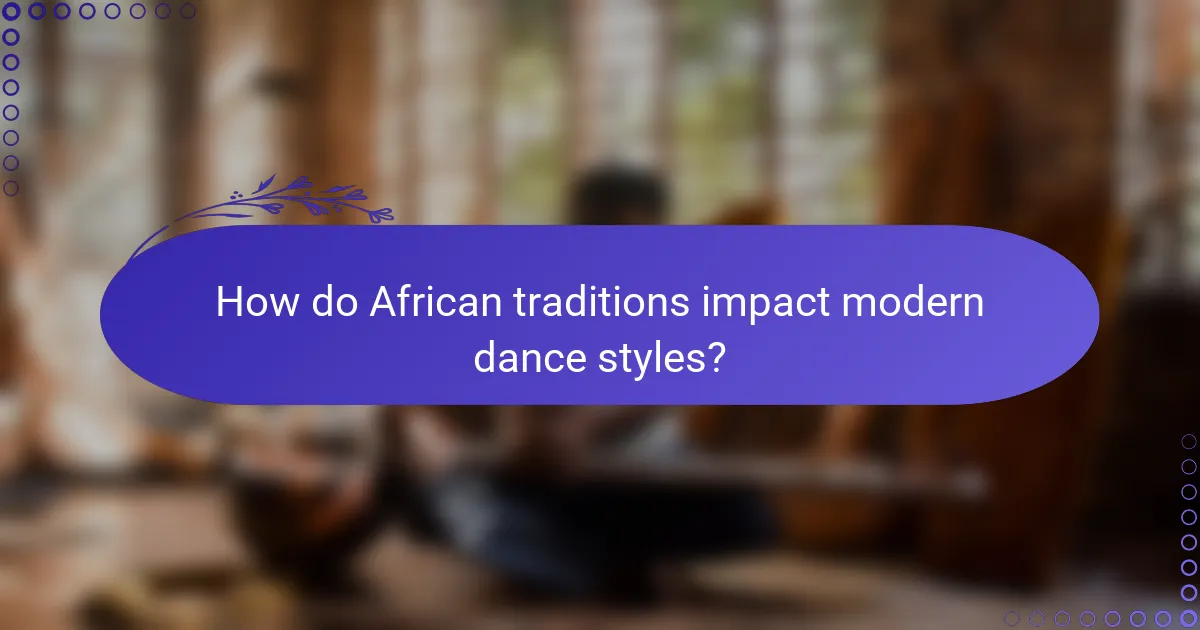
How do African traditions impact modern dance styles?
African traditions significantly influence modern dance styles by introducing rhythmic complexity, cultural storytelling, and communal participation. These elements shape various contemporary genres, enriching them with unique movements and expressions that resonate with audiences worldwide.
Afrobeats influence
Afrobeats, a genre rooted in West African music, has transformed modern dance styles by incorporating its infectious rhythms and vibrant energy. This genre encourages improvisation and personal expression, allowing dancers to connect deeply with the music. Popular dance moves like the Shaku Shaku and Gwara Gwara exemplify how Afrobeats has inspired global dance trends.
Incorporating Afrobeats into dance routines can enhance performances by adding dynamic movements that engage audiences. Dance studios and choreographers often blend Afrobeats with hip-hop and contemporary styles to create innovative routines that appeal to diverse audiences.
Traditional dance integration
Many modern dance styles integrate traditional African dances, preserving cultural heritage while adapting to contemporary contexts. Dances such as the Zulu Indlamu or the Maasai Adumu are often featured in performances, showcasing their unique footwork and storytelling elements. This integration not only honors the origins of these dances but also introduces their rich narratives to new generations.
When incorporating traditional dances, it is essential to respect their cultural significance. Dancers should study the history and context of these movements to authentically represent them in modern choreography.
Contemporary choreography
Contemporary choreography often draws from African dance techniques, emphasizing fluidity, groundedness, and polyrhythmic movement. Choreographers experiment with these elements to create pieces that reflect both personal and collective experiences. This fusion results in performances that are visually captivating and culturally resonant.
To effectively incorporate African influences into contemporary choreography, dancers should focus on body isolation and rhythmic patterns. Workshops and classes that specialize in African dance can provide valuable insights and techniques to enhance modern dance forms.
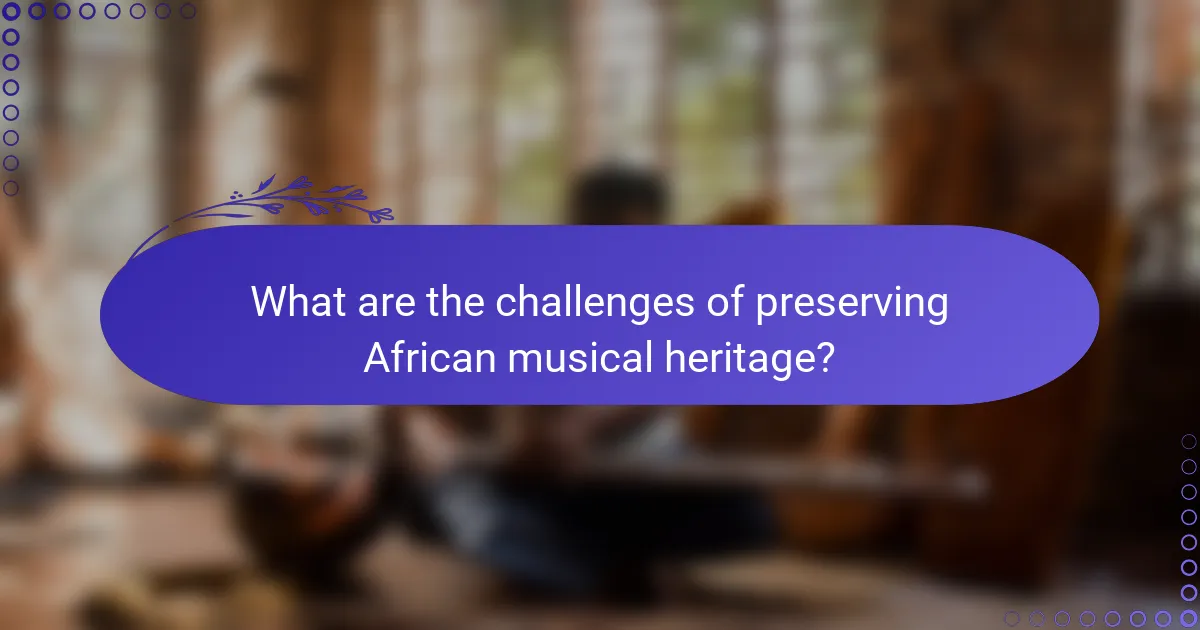
What are the challenges of preserving African musical heritage?
Preserving African musical heritage faces significant challenges, including commercialization and globalization. These factors can dilute traditional practices and alter the authenticity of music, leading to a loss of cultural identity.
Commercialization of music
The commercialization of African music often prioritizes profit over cultural integrity. As artists seek to appeal to broader markets, traditional sounds may be blended with popular genres, resulting in a loss of authenticity.
For instance, the rise of Afrobeat has led to a fusion of traditional rhythms with pop elements, which can attract larger audiences but may overshadow the original cultural significance. This trend can create a cycle where traditional music is undervalued and less frequently performed.
Globalization effects
Globalization has introduced African music to international platforms, but it also poses risks to its preservation. As African artists gain global recognition, they may feel pressured to conform to Western music standards, which can dilute their cultural expressions.
Moreover, the accessibility of digital platforms allows for the rapid spread of music, but it can lead to the appropriation of traditional sounds without proper credit or understanding. This can result in a disconnect between the music and its cultural roots, making it essential for artists and audiences to engage with the heritage meaningfully.
